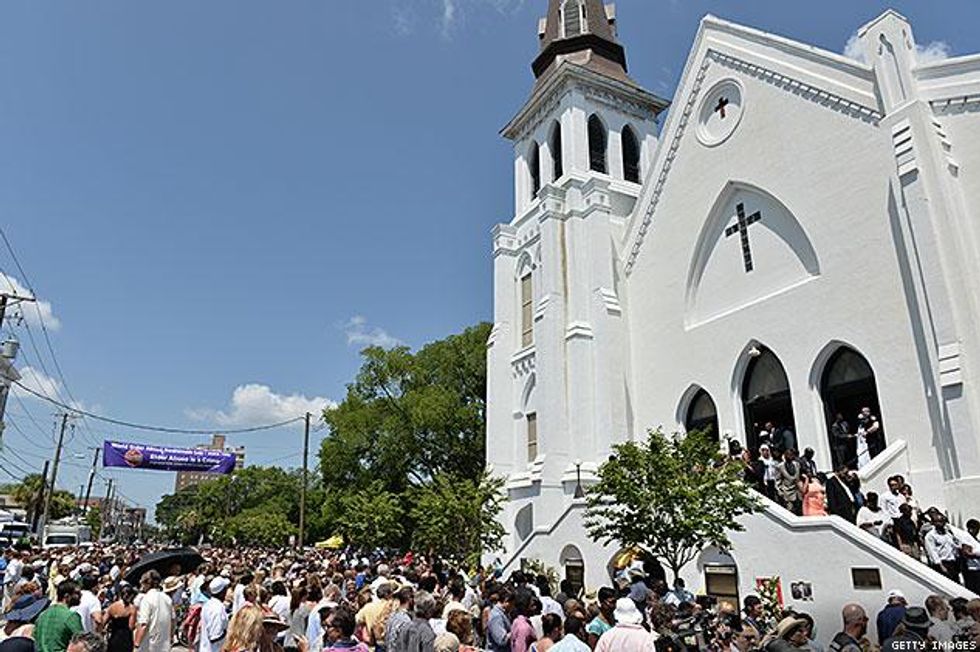
Ensuring the safety of people of color -- be they young black men, transgender women, or church families -- requires all of us to act, says this out minister.
June 24 2015 5:00 AM EST
November 17 2015 5:28 AM EST
By continuing to use our site, you agree to our Private Policy and Terms of Use.


"I forgive you," Nadine Collier, the daughter of 70-year-old Ethel Lance, said at a hearing for Dylann Roof, who stood accused of killing her mother. Her voice breaking with emotion, Collier continued, "You took something very precious from me. I will never talk to her again. I will never, ever hold her again. But I forgive you. And have mercy on your soul."
What if we start by listening to the families? Not the candidates, not the pundits, not the advocacy groups. But the families who have somehow summoned love and forgiveness from the depths of grief.
Forgiveness is not a sentimental gesture. It is a profound way to recenter our morality in a time of crisis. A way to assert that even in the chilling presence of evil, it is possible to choose love.
The massacre in Charleston is the grief of nine families, of a storied congregation. In grief there is deep pain, there are ultimate and yet unanswerable questions. Fellowship, ritual, home-cooked meals, friends who will simply be with you versus telling you what to feel -- all of these things help. But there is no real analgesic. No way to rush through it.
Our nation is also grieving. Grieving for the loss of nine souls. Grieving for the broken spirit of a young man infected by violence. Grieving because, like a too-clever virus, racism keeps mutating, spreading.
In moments of collective grief, we are drawn together. But linked fates alone do not ensure commitment to one another. It takes more than knowing this, more than naming this. To heal, to ensure each other's survival, we must act from this basis of mutuality.
The national crisis about the safety of people of color -- whether they are young black men, transgender women, or church families gathered for Bible study -- requires that all of us act. It requires a full-throttled response that includes everything from our personal relationships to the politicians we elect to the policies we pass.
I have heard people say that if the horror of Newtown didn't lead to gun reform, nothing can. I have heard people say that if the horror of Tamir Rice's murder didn't lead to national policing reform, nothing can.
I get it. The pain is real and can feel immobilizing.
But to submit to impotence in the face of evil could be our greatest failure in this moment. Evil regimes have wreaked havoc on bodies, lives, souls. But they have also been overcome by the human capacity for love, for transformation, for empathy, for strength that exceeds what we thought we were capable of.
There is never nothing to do.
First we must accept that this is our reality, letting go once and for all the delusion that racism is extinct. Part of our work is understanding the particular nature of racism in 2015 America, an analysis that must integrate the historical, structural, moral, and political.
But let us not get stuck in the heady realm of analysis. We already know enough to act.
Consider Emanuel African Methodist Episcopal Church. Consider its history as a locus of spiritual strength and political resistance in Charleston's black community; consider its capacity to rise again from the ashes. On Sunday, Emanuel AME Church opened its doors for worship, its pews filled. That evening, more than 10,000 people came together in Charleston to express condemnation of racial violence and support for this congregation. This is what it looks like to live into faith, to act in a time of crisis.
What comes next matters too. Moving forward, white people have to step up and start talking -- really talking -- to other white people about race. Will there be uncomfortable conversations with people you love? Definitely. But what a very small price to pay when others are paying the ultimate price.
And yes, take the Confederate flag down. Public symbols matter and send a clear message about what we value as a people. There are ways to engage the history of the South without also venerating a confederacy that was -- explicitly, inarguably -- built on a defense of slavery. It would take no more than 10 minutes to take the flag down, fold it up and store it somewhere. We can do at least that.
In the longer view, we must build political power to put the South on a path to progress and reverse our current regressive trend. We are hardly the first people to confront the challenge of building political power in a hostile climate. It can be a long slog, but it's not rocket science: voting in every primary, every election; recruiting new candidates who are people of color, women, LGBT; proposing sane legislation again and again, even if it dies in committee.
In all of this -- the personal, the public, the political, we face a choice about how to engage the other, the one who despises that which we love. May we, as a nation, be at least as brave as these grieving families. Brave enough to forgive, to love our enemy, to find hope in the unseen.
The arc of the moral universe bends toward justice, yes, but its nature is pendulous rather than linear: the propulsive swing of progress, the cruel pull of violence, and then back again. With this jagged rhythm comes a constant reminder: The work of justice is never done.

Want more breaking equality news & trending entertainment stories?
Check out our NEW 24/7 streaming service: the Advocate Channel!
Download the Advocate Channel App for your mobile phone and your favorite streaming device!
